Our legacy is built not just on our products, but on enduring relationships — with communities, consumers, investors, partners, and employees. These relationships form the cornerstone of our identity, built on trust, transparency, and a shared commitment to creating long-term value.
We believe that a responsible business must be anchored in strong ethics and operate with integrity. Our zero-tolerance approach to fraud, bribery, and corruption, along with our commitment to data privacy and transparent disclosures, reflects our dedication to doing what is right, even beyond regulatory requirements. We maintain open channels of communication with all stakeholders, ensuring that their voices inform our decisions and shape our actions. Through robust grievance redressal systems, proactive community engagement, and a culture of mutual respect, we continue to strengthen the social fabric that binds us to the people we serve.
As we look ahead, we remain steadfast in our vision: to be a catalyst for positive change, dedicated to the health and wellbeing of every household.
"What is that life worth which cannot bring comfort to others."
— Dabur Founder Dr S K Burman
Dabur has long recognised the importance of inclusive growth and community empowerment as integral to its corporate ethos. Since 1994, well before the enactment of formal CSR legislation, we have been proactively engaged in structured community development initiatives. Our efforts are focused on fostering social and economic progress in the regions where we operate, with a special emphasis on uplifting underprivileged sections of society. Today, we work hand in hand with communities to co-create sustainable ecosystems that are resilient, self-reliant, and future-ready.
In FY 2024-25, we invested ₹37.27 crore in community development programmes, spanning thematic areas like Education, Healthcare, Skill-Building, and Environmental Stewardship. These efforts are amplified by the active involvement of our employees and partners, who embody our values through volunteering and grassroots engagement.

Performance Highlights
₹37.27 CRORE
invested in community development programmes
3.61 MILLION
beneficiaries of CSR projects in India
221 DISTRICTS
covered through CSR programmes
17
Government Schools upgraded to Model Schools
7,209
students get access to improved learning environment
13,191
acres of land under cultivation of medicinal herbs
12,753
farmers engaged in the cultivation of medicinal and aromatic plants
4.95 MILLION
saplings of multipurpose plant species distributed and planted
17,141
farmers engaged in bee-keeping
353%
increase in community water conservation capacity
Our CSR governance framework is designed to ensure strategic alignment, operational excellence, and measurable impact across all our community development initiatives. Anchored in transparency, accountability, and inclusivity, our governance structure enables us to deliver on our commitment to social equity and sustainable development.
Our CSR efforts are guided by a multi-tiered governance model. At the apex is the CSR Committee of the Board, comprising four Directors, which provides strategic direction and ensures compliance with the Companies Act, 2013. Complementing identity, built on trust, Dabur Management Committee, which monitors progress against annual targets and ensures alignment with business objectives.
Our CSR Policy, approved by the Board, serves as a formal declaration of our intent to foster a self-reliant and inclusive society. The CSR department plays a pivotal role in translating this vision into action, providing quarterly updates to the Board Committee on project milestones, impact metrics, and any variances from planned outcomes.
Dabur’s CSR initiatives are deeply rooted in the socio-economic realities of the regions where we operate. Many of our manufacturing locations are situated in areas with significant backward population, and we have taken proactive steps to address local development challenges through thematic, community-driven programmes.
Priority Areas of Intervention
Our CSR programmes. are designed around the core pillars of:
- Eradicating Hunger, Poverty and Malnutrition with programmes for fighting malnutrition inunderserved communities
- Promoting Healthcare through primary and preventive healthcare, maternal and child health, and adolescent wellness
- Promotion of Ayurveda by supporting institutions in driving community welfare through this traditional form of medicine
- Ensuring Environmental Sustainability through a series of interventions around water conservation, herb cultivation and promoting solar power in rural areas
- Promotion of Education by ensuring quality enhancement in education and providing students access to computer education
In addition, other areas identified for rolling out development projects are: - Women’s Empowerment through skill-building, and entrepreneurship, besides strengthening grassroots institutions such as Self-Help Groups
- Promotion of Sports by offering training to local youth in Boxing and Football
- Rural Development
- PM Internship Scheme
Through this robust governance framework, Dabur ensures that its CSR initiatives are not only compliant and well-managed but also impactful, inclusive, and aligned with the broader goal of nation-building.
At Dabur, our commitment to community development is deeply rooted in a participatory and needs-based approach. Each CSR initiative is preceded by comprehensive need assessment studies, including community meetings and Focus Group Discussions (FGDs), ensuring that voices from all segments of society are heard. The initiatives are implemented through our dedicated CSR foundations like Jivanti Welfare & Charitable Trust (JWCT) and Sustainable Development Society (SUNDESH) in collaboration with trusted partner NGOs, ensuring both relevance and impact.
In FY 2024-25, ₹37.27 Crore was spent on community development interventions. Details of the number of beneficiaries across the areas of development are given below:
| CSR Intervention Areas | Number of Beneficiaries |
| Eradicating Hunger, Poverty, and Malnutrition | 19,60,742 |
| Promoting Healthcare | 14,20,191 |
| Ensuring Environmental Sustainability | 1,67,626 |
| Promotion of Ayurveda | 29,976 |
| Providing employment generating vocational skills and women | 19,404 |
| Promotion of Education | 8,465 |
| Promotion of Sports | 5,872 |
| PM Internship Scheme | 2 |
Our CSR Projects: Empowering Communities, Enabling Change
At Dabur, our CSR projects are shaped by a deep commitment to inclusive development. Creating meaningful opportunities for the development of underserved sections of the society lies at the heart of our community engagement efforts. Some of the year’s most impactful projects that reflect this commitment in action are:
Mission Aahaar: Nourishing Lives, One Meal at a Time
A flagship nutrition support programme, Mission Aahaar, seeks to address food insecurity and promote dietary awareness among underserved communities. Implemented across government schools in Delhi and Bihar, the initiative supplements mid-day meals with essential nutritional products and supplements to enhance the health and wellbeing of schoolchildren. Special awareness sessions are also conducted on balanced diets and healthy eating habits, reinforcing our commitment to building healthier, more resilient communities.

- Number of Districts covered: 2
- Number of States covered: 2
- Number of beneficiaries: 10,700
Madaari Mitr: Advancing Inclusion Through Awareness and Wellness
Madaari Mission for Total Rehabilitation (Madaari Mitr), implemented in partnership with Dev Excel Foundation, is a dedicated initiative aimed at uplifting the Madari Mushhar, and other marginalised communities in Varanasi. Special sessions on ‘Good Touch, Bad Touch’ are organised for children from the marginalised communities as part of this initiative, besides specialised Ayurveda health camps to ensure inclusive and compassionate community development.
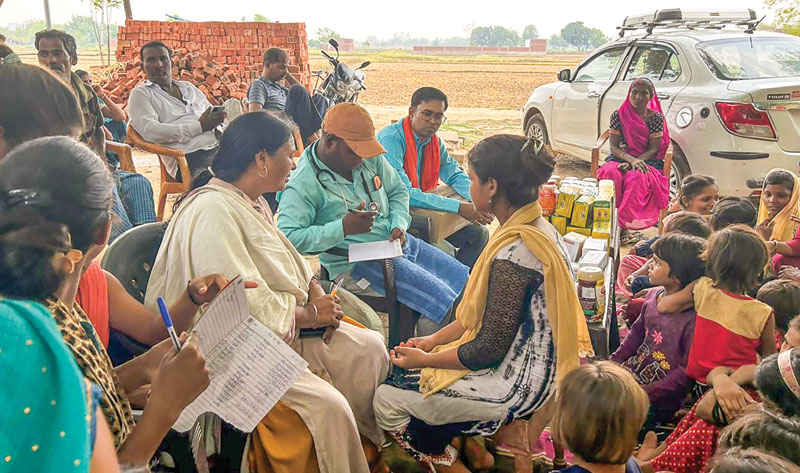
- Number of Districts covered: 4
- Number of States covered: 1
- Number of beneficiaries: 10,000
Swasthya aur Suraksha: Building Healthier Homes and Futures
An integrated development programme with a special focus on the wellbeing of the girl child, Swasthya aur Suraksha -- also called Swasth Ghar (Swag) -- promotes holistic health and hygiene through activities such as kitchen gardening, organic farming, dental check-ups, and hand-washing awareness. It also includes targeted nutrition and breastfeeding education, delivered through awareness camps in schools and villages.
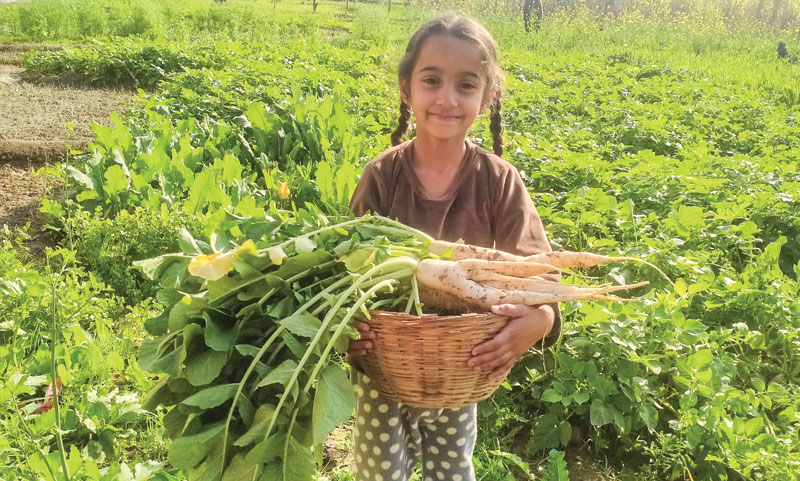
A detailed Impact Assessment of this initiative was conducted by a third-party agency in 2024-25, which can be accessed here:
- Number of Districts covered: 8
- Number of States covered: 5
- Number of beneficiaries: 47,805
Vridhcare: Supporting Dignity & Wellness in Later Life
A dedicated initiative to enhance the health and wellbeing of elderly residents in old-age homes. Under this initiative, a specialised physiotherapy lab was installed at an old-age home in Delhi to offer to scientific, inclusive and compassionate care for senior citizens. Regular health camps are also organised along with the provision of nutritious meals, dietary support, and engagement sessions to foster emotional wellbeing
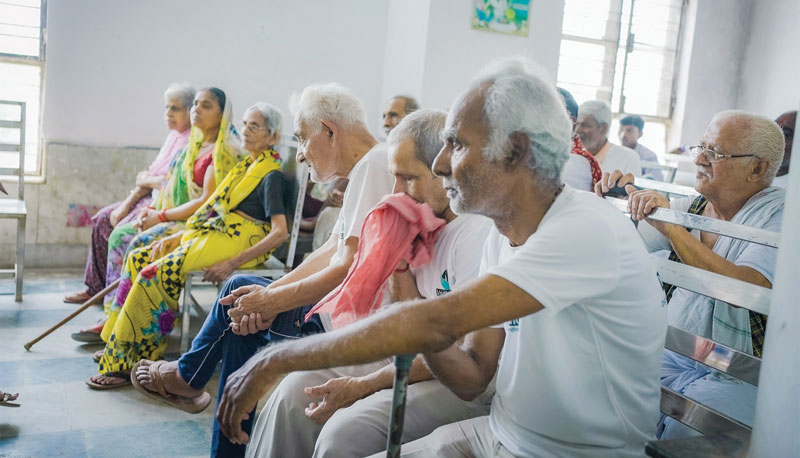
- Number of Districts covered: 8
- Number of States covered: 3
- Number of beneficiaries: 1,361
Saksham: Restoring Lives Through Neuro-Rehabilitation
In partnership with the Indian Head Injury Foundation (IHIF), Dabur runs Saksham, a specialised initiative focused on the rehabilitation of head injury and brain trauma survivors in the Jodhpur region. The programme offers comprehensive diagnosis and treatment for traumatic brain injuries, along with dedicated neuro-rehabilitation services. It also extends support to children with cerebral palsy, helping them regain mobility and improve their quality of life, underscoring our commitment to inclusive healthcare and long-term recovery support.
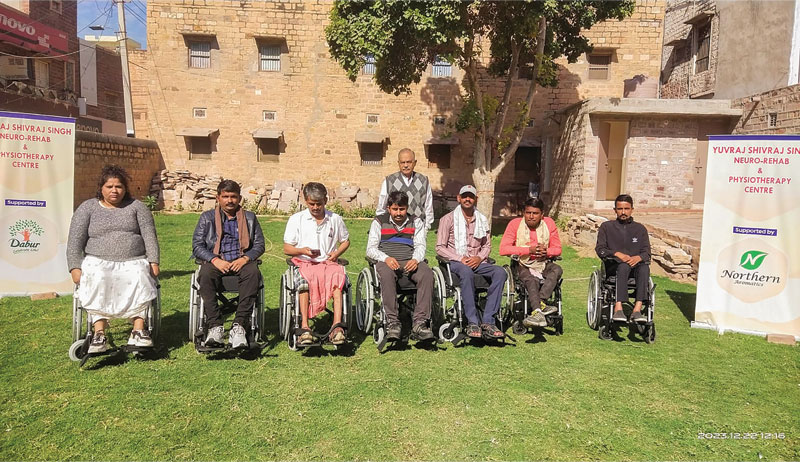
- Number of Districts covered: 1
- Number of States covered: 2
- Number of beneficiaries: 2,253
Herbal Kingdom: Empowering Farmers Through Herbal Cultivation
As part of Dabur’s commitment to sustainable development and community empowerment, the Herbal Kingdom initiative was launched to supplement farmer incomes by engaging them in the cultivation of herbs and medicinal plants. This project not only promotes traditional knowledge and biodiversity but also ensures a steady livelihood for rural communities. This project fosters inclusive growth while contributing to environmental sustainability and rural prosperity.
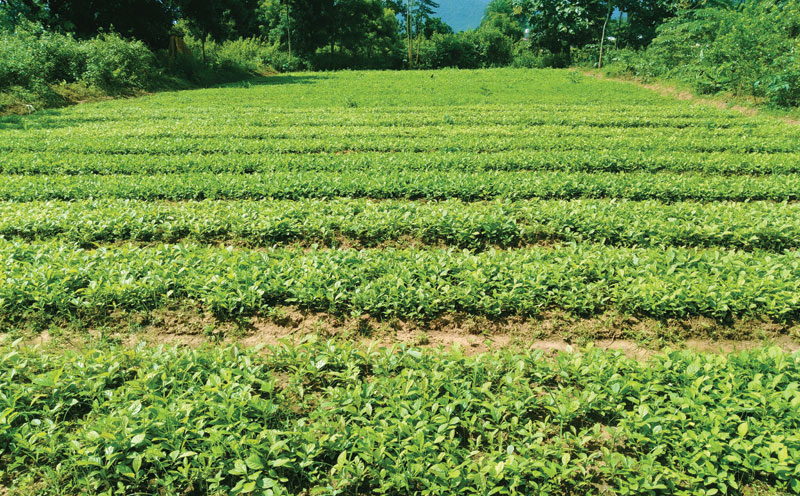
A detailed Impact Assessment of this initiative was conducted by a third-party agency in 2024-25, which can be accessed here:
- Number of Districts covered: 32
- Number of States covered: 13
- Number of beneficiaries: 11,738
Plantation Drive: Greening Communities, Enriching Lives
Another key aspect of Dabur’s commitment to environmental stewardship, plantation drives are conducted across communities and near manufacturing locations to enhance green cover and promote ecological balance. These efforts are carried out in collaboration with local administrations and government departments in Uttarakhand, Rajasthan, and Madhya Pradesh, as well as in schools redeveloped by Dabur in Jammu and other regions, reflecting our dedication to creating a greener, healthier future for all.
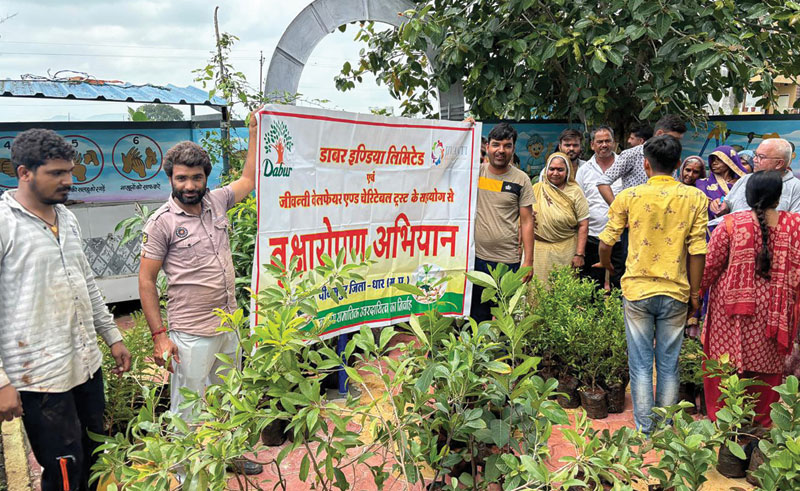
- Number of Districts covered: 7
- Number of States covered: 5
- Number of saplings planted: 24,667
- Number of beneficiaries: 61,490
Harnessing the Sun: Lighting Up Lives with Solar Power
This initiative is focused on promoting renewable energy and improving quality of life in non-electrified villages across our project areas. Under this programme, we installed 122 solar streetlights and equipment in 15 villages and 11 schools, with active financial participation from local communities and village panchayats. This initiative reflects our commitment to sustainable development and inclusive growth by harnessing clean energy to brighten lives.
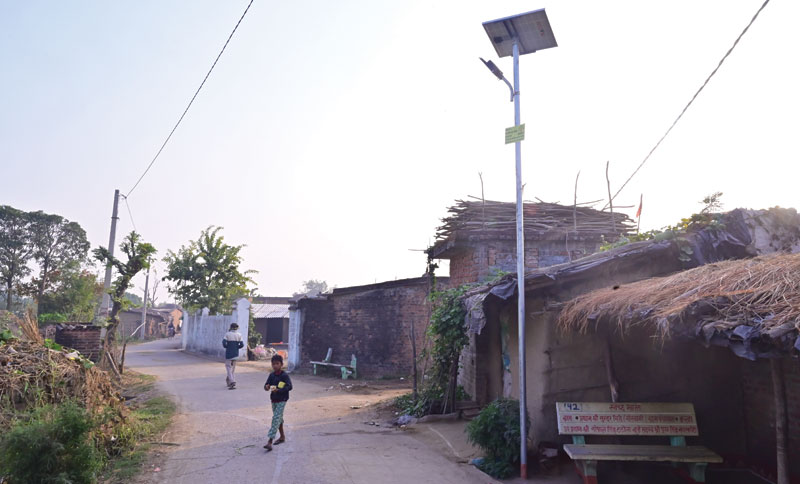
- Number of Districts covered: 4
- Number of States covered: 4
- Number of beneficiaries: 3,180
Desert Bloom: Reviving Water, Replenishing Lives
Water conservation lies at the heart of Dabur’s sustainability mission. Through our flagship community-level water conservation initiative, Desert Bloom, we are restoring vital water resources in water-stressed regions to ensure long-term water security for communities. The project focuses on reviving and creating sustainable water structures such as ponds, water bodies, and check dams to enhance groundwater recharge and ensure year-round water availability for communities.
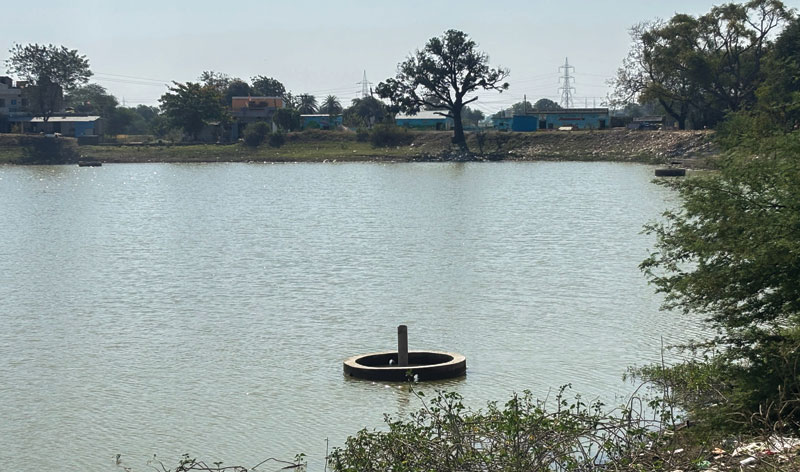
Under this project, we have successfully revived and constructed 20 water bodies across 6 states of Uttar Pradesh, Rajasthan, Uttarakhand, Himachal Pradesh, Assam, and Madhya Pradesh.
These efforts have significantly enhanced our community water replenishment capacity, which now stands at 944,697 KL, marking a 353% increase over the previous year. This progress has propelled us to achieve 86% of our Water Positive target, up from just 34% a year earlier.
Beyond infrastructure, Desert Bloom promotes community-led water stewardship. We actively engage local panchayats and residents in the planning and maintenance of water structures. Educational outreach on rainwater harvesting, greywater reuse, and water-efficient agriculture further empowers communities to adopt sustainable water practices. Through Desert Bloom, Dabur continues to nurture a water-secure future — one drop, one village at a time.
- Number of Districts covered: 6
- Number of States covered: 6
- Total water replenishment capacity created: 944,697 KL
- Number of beneficiaries: 24,137
Community-Led Plastic Waste Management Programmes
Dabur has taken a proactive stance in addressing the plastic waste crisis by embedding sustainability not just into its core operations but also in its community outreach programmes. Our flagship community-level initiative, ‘My 10 Kg Plastic’, has already emerged as a powerful movement for waste segregation at source with active participation from over 70,500 households and institutions in Delhi and Jammu. We also empower women through our vocational training centres to produce sustainable cotton bags, promoting alternatives to single-use plastics and fostering economic independence. Our holistic approach includes healthcare support for waste collectors, awareness programmes for ragpickers on safe waste handling, providing protective gear and nutritious food, and supporting the non-formal education centre for their children, helping bridge them into mainstream schooling.
A detailed Impact Assessment of this initiative was conducted by a third-party agency in 2024-25, which can be accessed here:
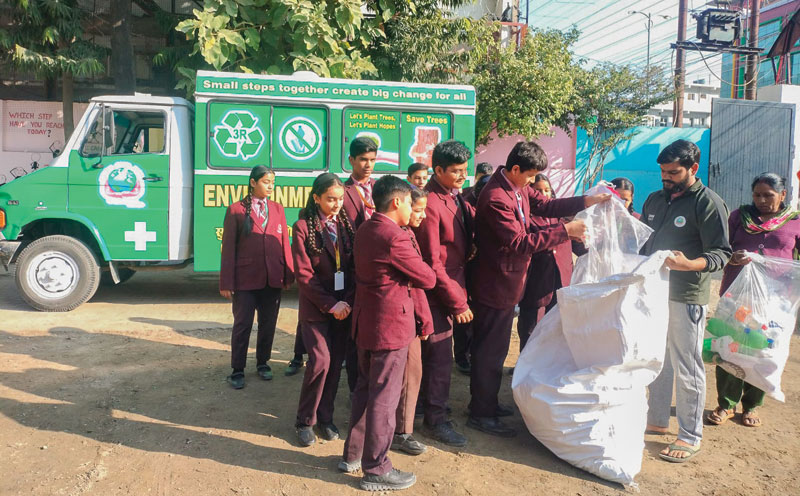
Gyan Arjan Kendra: Bridging Learning Gaps Through Remedial Education
Dabur is committed to nurturing young minds through inclusive education. Our Remedial Education Centres provide academic support to children who require additional help to keep pace with their studies. These centres serve as safe, supportive learning spaces that help bridge educational gaps and reduce dropout rates. Through personalised attention and community engagement, we aim to empower every child with the tools they need to succeed in school and beyond.
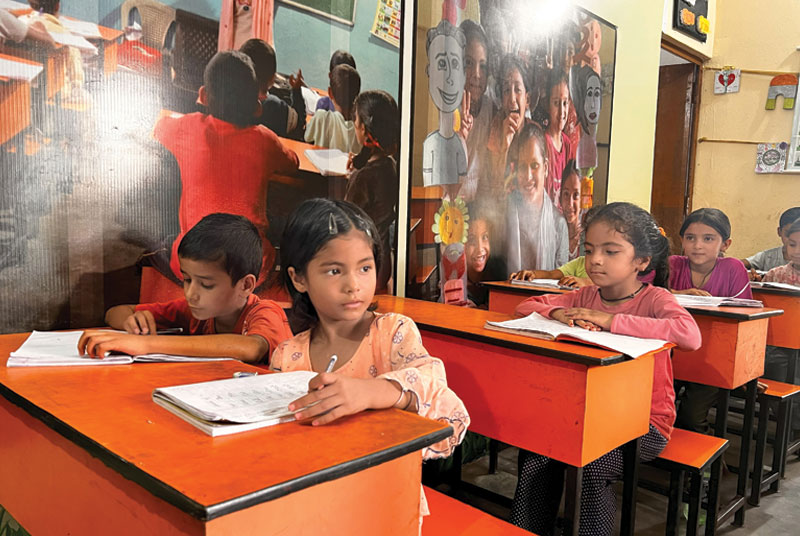
- Number of Remedial Education Centres: 18
- Number of Districts covered: 8
- Number of States covered: 5
- Number of Beneficiaries: 551
Adarsh Pathshala: Transforming Government Schools into Modern Learning Spaces
Our Adarsh Pathshala programme seeks to uplift the quality of education by transforming government schools into vibrant learning spaces by upgrading their infrastructure and creating a more conducive environment for students. Our efforts include renovating classrooms and boundary walls, setting up sanitation and potable water facilities, and providing modern desk-benches, and educational aids such as libraries and BaLA (Building as Learning Aid) paintings. We have also equipped schools with computers and established fully functional computer labs to promote digital literacy. Renovation work was successfully carried out in schools located in Kolkata, Silvassa, Ghaziabad, Baddi, Tezpur, Indore, and Pantnagar in FY 2024-25, helping transform these institutions into vibrant, modern spaces that inspire learning and growth.
A detailed Impact Assessment of this initiative was conducted by a third-party agency in 2024-25, which can be accessed here:
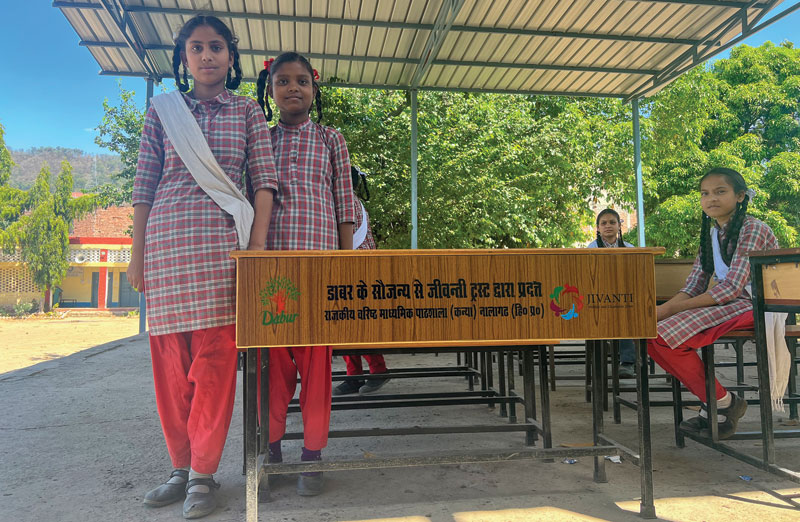
- Number of Schools revamped: 17
- Number of Districts covered: 7
- Number of States covered: 7
- Number of Beneficiaries: 7,209
Computer Literacy Centre: Empowering Rural Youth Through Digital Skills
Dabur’s Computer Literacy Centre initiative is bridging the digital divide by equipping rural youth and communities with essential computer skills. Run in partnership with the NIIT Foundation, these centres offer foundational computer education, now enhanced with a Tally accounting course, to improve employability. The programme is also expanding to include cybersecurity awareness, ensuring that both children and villagers are better prepared to navigate the digital world safely. This programme has been contributing to financial inclusion and digital empowerment at the grassroots level.
- Number of Computer Centres: 9
- Number of Districts covered: 7
- Number of States covered: 5
- Number of Beneficiaries: 224
Nari Shakti Kendra: Building Skills, Transforming Lives
Dabur’s Vocational Training and Women Empowerment programme is creating pathways to financial independence for women and girls in rural India. At these centres, called Nari Shakti Kendra, we are equipping women with income-generating skills that are helping them uplift their families and communities. The programme offers six-month courses in Stitching-Tailoring and Beauty Care, enabling participants to start their own ventures or secure employment locally.
In partnership with Usha Silai School, we have also introduced advanced training in tailoring and machine repair, with certified recognition for our stitching students. This not only enhances their technical proficiency but also boosts their confidence and credibility in the marketplace. By empowering women with practical skills and entrepreneurial potential, the initiative is helping women become active contributors to their household income, improve their standard of living, and inspire a culture of self-reliance in their communities.
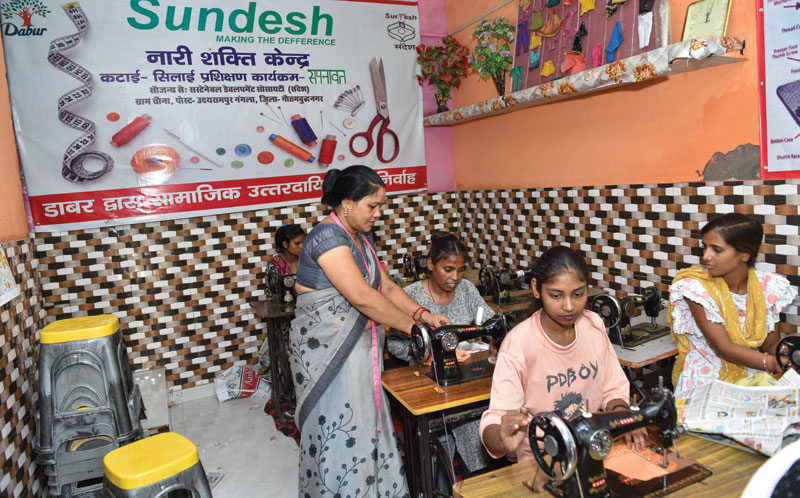
- Number of Vocational Training Centres: 28
- Number of Villages covered: 49
- Number of Districts Covered: 8
- Number of States covered: 5
- Number of Beneficiaries: 784
Bee the Change: Transforming Rural Lives Through Beekeeping
Dabur’s Beekeeper Livelihood Initiatives aim to create sustainable income opportunities for rural and tribal communities by training them in the art and science of beekeeping. Under this initiative, currently active across Uttar Pradesh, Uttarakhand, and Bihar, Dabur has also supported the community by distributing bee-boxes and helping them establish their own micro-enterprises. This initiative not only fosters financial independence but also plays a vital role in improving agricultural productivity through natural pollination, thereby enhancing crop yields and promoting ecological balance. By combining skill development with environmental stewardship, the Beekeeper Livelihood Initiatives are helping communities thrive economically and sustainably.
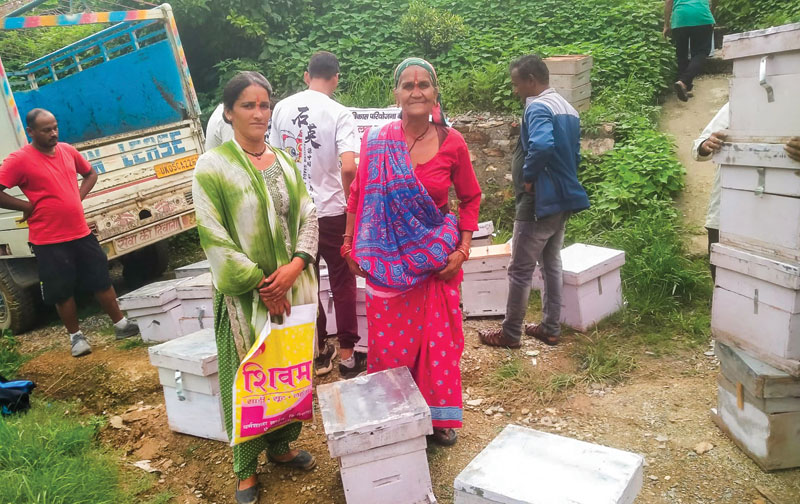
- Number of Districts covered: 31
- Number of States covered: 3
- Number of Beneficiaries: 17,141
From Pens to Prosperity: Livelihoods Through Livestock
Dabur’s Livelihood Promotion Programme is designed to empower underserved communities by equipping them with sustainable income-generating skills. Under this programme, we engage members of Self-Help Groups (SHGs) in duck, pig, and goat rearing, supported by scientific training to enhance productivity and profitability. These efforts not only provide families with a steady source of income but also foster a culture of entrepreneurship and self-reliance within the community. By promoting grassroots economic development, this programme is helping rural households become financially stronger and more resilient, while contributing to the broader goal of inclusive and sustainable growth.
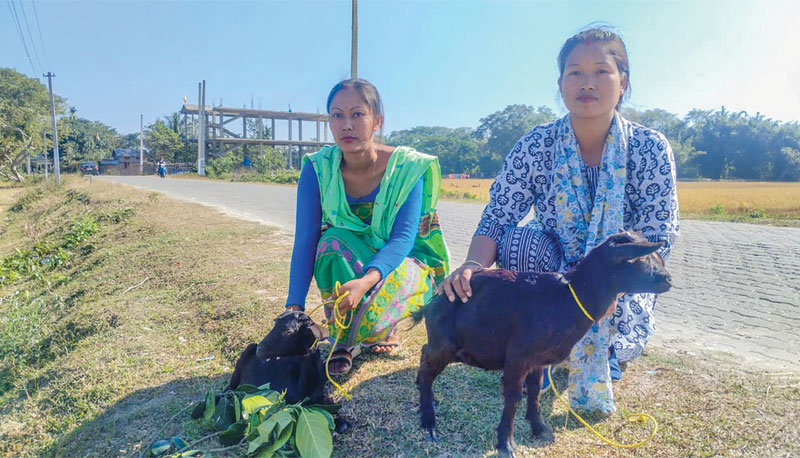
- Number of Districts covered: 5
- Number of States covered: 3
- Number of Beneficiaries: 197
Sports as a Catalyst: Building Confidence, Character, and Community
Dabur's Sports Training Centres in Tezpur, Assam, are a unique initiative designed to harness the power of sports to drive youth empowerment and community development. Established in response to local needs, these centres provide structured training in football and boxing to boys and girls from 10 neighbouring villages, offering them a platform to build discipline, confidence, and teamwork. The programme has already begun to show promising results with students from the centre representing Assam in boxing events held across the country, and bringing home top honours and recognition. The initiative is not only nurturing athletic talent but also opening doors to new opportunities for youth in underserved communities, helping shape a generation of confident, goal-oriented individuals ready to lead and inspire.
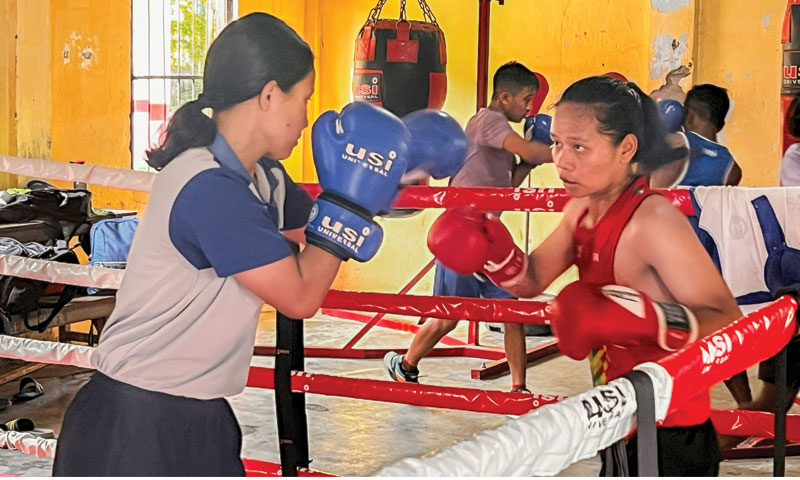
- Number of Districts covered: 1
- Number of States covered: 1
- Number of Beneficiaries: 72
Stories of Change: Real Lives, Real Impact
Rising Stars of Baddi: A Testament to Educational Empowerment
Dabur’s commitment to education was powerfully reflected this year through the outstanding performance of students enrolled in our Remedial Education Centres in Baddi. All 60 students from the three centres cleared their school examinations with flying colours, showcasing the transformative impact of focused academic support.
Among them, 11 students achieved top ranks in their respective classes — 6 secured 1st position, 4 achieved 2nd, and 1 student earned 3rd place. The remaining students also passed with commendable scores, reinforcing the effectiveness of our remedial learning model.
Their success is not just a personal milestone but a reflection of how targeted educational interventions can unlock potential and inspire excellence in underserved communities.
Boxing His Way to a Brighter Future
Chitra Raj Limbu’s journey from a small village in Assam to national recognition is a powerful testament to the impact of Dabur’s CSR-driven sports empowerment initiatives. A native of Belsiri in Sonitpur district, Chitra is the youngest of six siblings and a symbol of perseverance. Determined to support his education and passion for boxing, he joined Dabur’s Rangapara Boxing Coaching Centre in 2022.
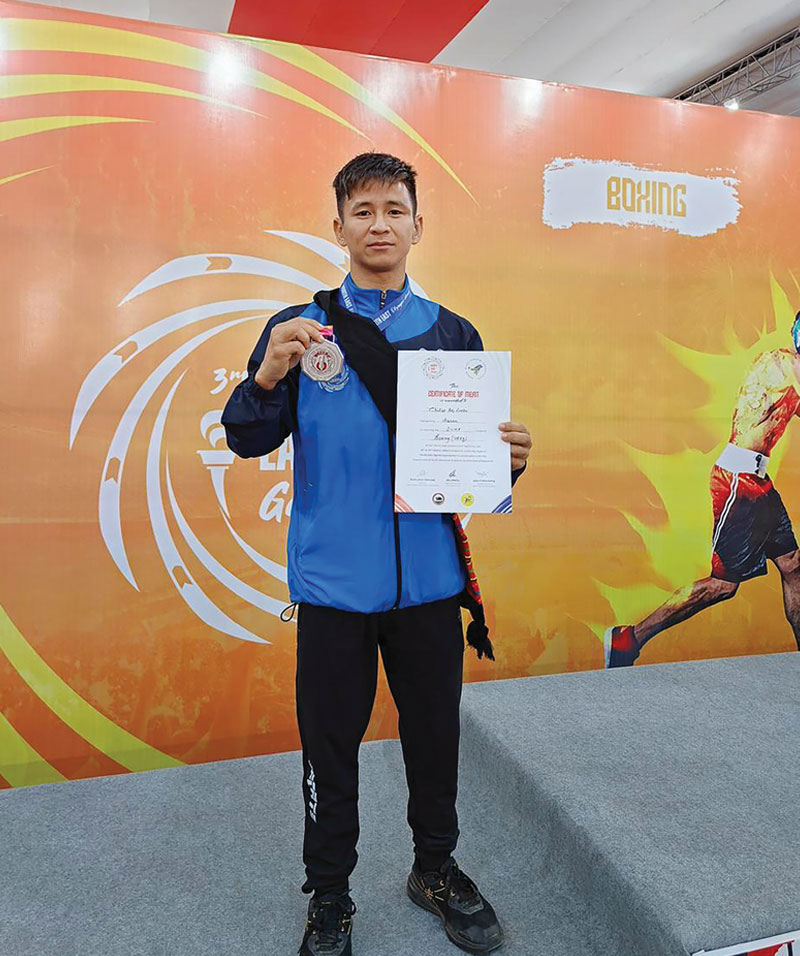
Over two years of rigorous training, Chitra emerged as one of Assam’s most promising young boxers, winning accolades such as a Gold Medal and Best Boxer title at the All-Assam Inter-District Junior and Elite Boxing Championship (2023), a Gold at the BFI East Zone Elite Men’s Boxing Championship, and a Silver at the 3rd Northeast Olympic Games. His dedication bore fruit this year, when he was selected to join the Jammu and Kashmir Rifles infantry regiment under the Boxing Sports Quota — securing a government job purely on the strength of his sporting credentials. Chitra’s story is not just about sporting excellence, it’s about how structured support, resilience, and opportunity can transform lives, create livelihoods, and build role models for the next generation.
A Journey from Learning to Livelihood
At just 18 years old, Prity Thakur from Bamungola village in Sonitpur, Assam, has become a symbol of self-reliance and determination. After completing a six-month Beautician Course at Dabur’s Jivanti Skill Training Centre, Prity took the bold step of launching her own home-based beautician service.
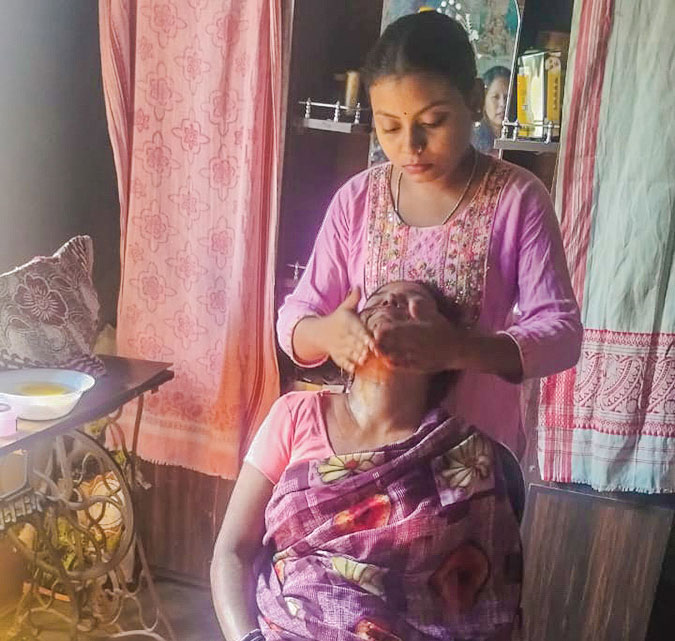
Today, she earns between ₹1,500–2,000 per month, contributing meaningfully to her family’s income and gaining financial independence. Her story reflects the transformative power of skill development in rural communities — where access to vocational training not only builds confidence but also opens doors to sustainable livelihoods.
Prity’s success is a testament to Dabur’s commitment to empowering young women with the tools they need to shape their own futures.
Turning Digital Skills into a Sustainable Livelihood
Hailing from Bardari village in Pithampur, Madhya Pradesh, Atul Raghuvanshi is a shining example of how digital literacy can unlock entrepreneurial potential. After completing the Basic Computer Literacy Course at Dabur’s Computer Literacy Centre, Atul decided to take his learning forward by launching his own business.
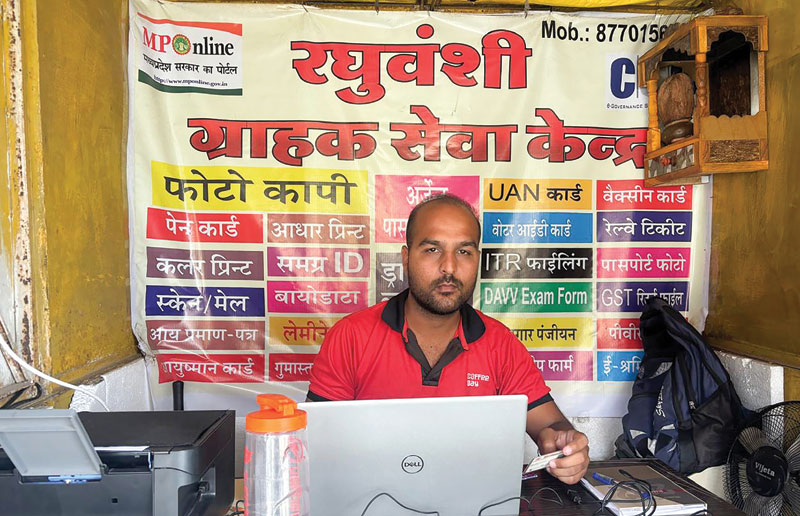
He acquired a Kiosk ID and set up a digital services store in his village, offering assistance with essential services such as PAN, Aadhaar, and driving licence applications. Today, Atul earns approximately ₹20,000 per month, providing vital digital access to his community while securing a stable livelihood for himself. His kiosk has become a local hub for accessing online utilities, digital payments, and government services—bridging the digital divide in his area.
Atul’s journey reflects the power of skill-based education in creating employment, fostering entrepreneurship, and building digitally inclusive rural communities.
A Digital Journey from Aspiration to Employment
Coming from an economically challenged background, Dia Mehra from Pantnagar aspired to support her family by becoming employable. Her journey began with a visit to Dabur’s Computer Literacy Centre, where she expressed her desire to pursue a basic computer course. Recognising her determination and financial constraints, Dabur waived her course fee and supported her throughout the training.
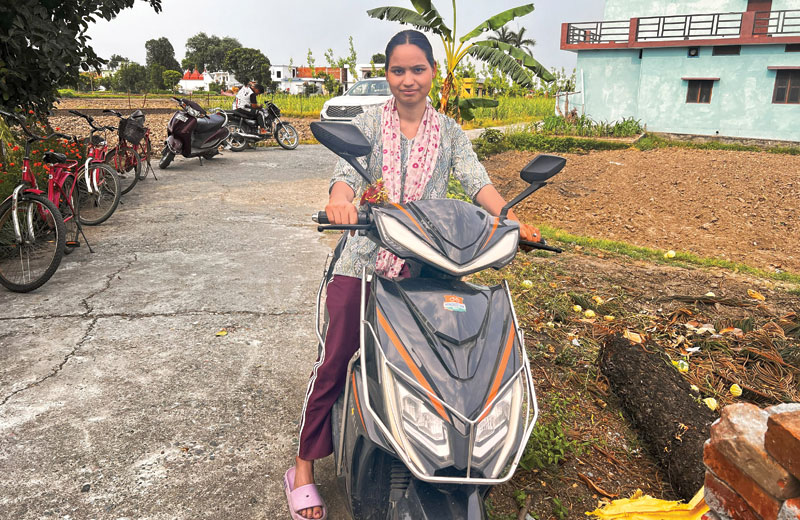
With newly acquired digital skills and confidence, Dia first secured a job at a local gas agency and has since moved to manage the computer systems at a mall in Ramnagar, where she earns ₹12,000 per month. Her story is a powerful example of how targeted support and skill-building can empower individuals from underserved communities to achieve financial independence and contribute meaningfully to their households. Dia’s success reflects Dabur’s commitment to inclusive growth and digital empowerment at the grassroots level.
From Learner to Leader, Empowering Hundreds
Pooja Takuli began her journey at Dabur’s Vocational Training Centre as a student eager to build a better future. After successfully completing her training, she didn’t just stop at transforming her own life - she chose to uplift others. Today, Pooja works as a trainer with Jivanti, where she has become a beacon of inspiration for young women in her community.
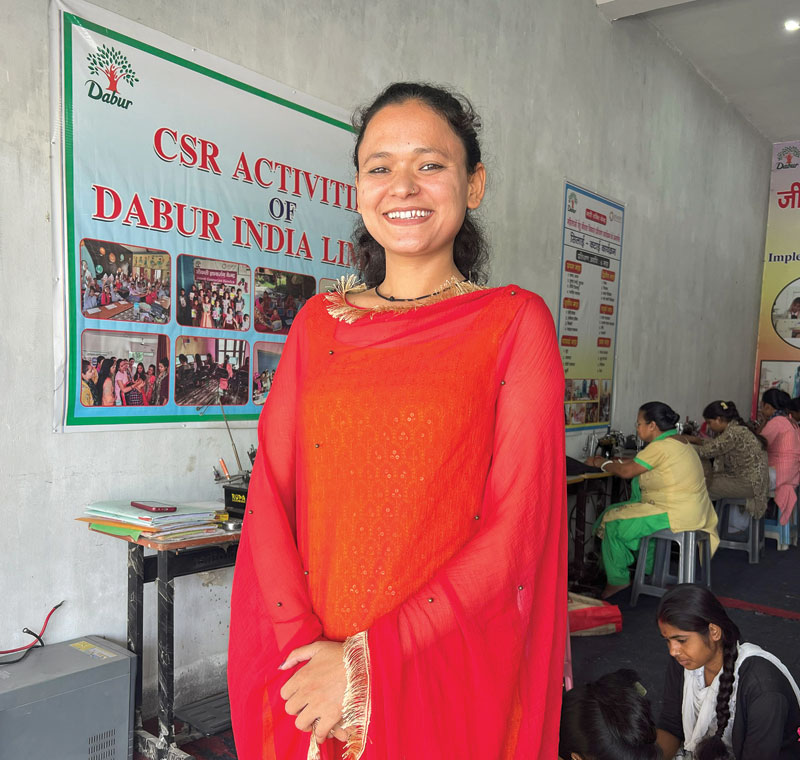
Driven by a passion to empower others, Pooja has trained over 900 local girls in vocational skills such as stitching and tailoring. Her mentorship has helped around 300 of them establish their own small businesses, with many now earning between ₹5,000 and ₹12,000 per month. Through her dedication, Pooja is not only fostering financial independence among rural women but also creating a ripple effect of self-reliance and confidence across the community.
Her story is a shining example of how Dabur’s CSR initiatives are nurturing grassroots leaders who multiply impact and drive lasting change.
Employee Volunteering: A Step Together
At Dabur, we believe that meaningful change begins with individual action. Our employee volunteering initiatives are a testament to this belief, enabling our people to activelycontribute to the communities we serve. Through structured quarterly volunteering calendars and CSR Days, Dabur employees across locations have come together to address pressing social issues with compassion and commitment.
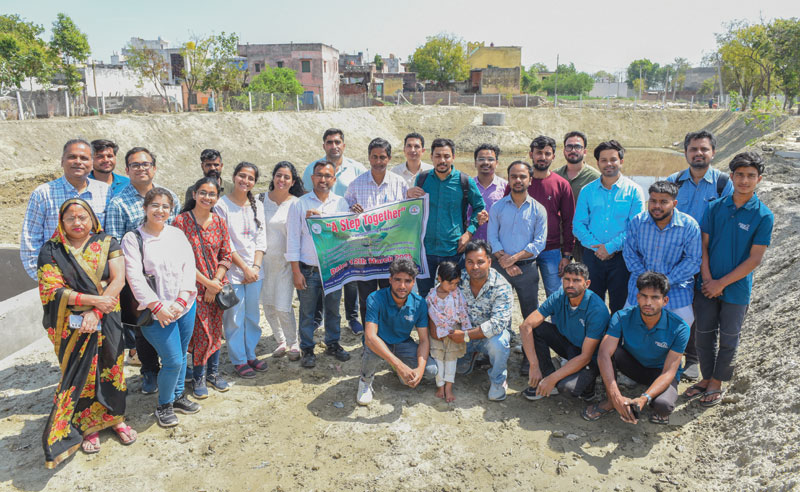
In FY 2024-25, our employees participated in a wide range of community engagement activities. These included plantation drives, interactive sessions with school children offering career guidance and counselling, and visits to old-age homes where volunteers spent quality time with residents, engaging in games, wellness sessions, and emotional support activities. These efforts were not only enriching for the communities but also deeply fulfilling for our employees.
A total of 227 employees participated in 30 volunteering activities across 10 locations during the year. By leveraging employee volunteering, Dabur continues to address critical social challenges while nurturing a culture of empathy and responsible leadership within the organisation.
At Dabur, we are deeply committed to providing transparent and accessible information about our products and services to ensure that consumers are well-informed and empowered. Consumers can easily connect with us through our website (www.dabur.com), a dedicated email address, and a toll-free phone number for consultations with product specialists. We also offer the opportunity to speak with qualified Ayurvedic practitioners for personalised advice and to place orders for Ayurvedic medicines. Our products are readily available for purchase on various online marketplaces or directly through the DaburShop (www.daburshop.com) platform.
We engage with our consumers across various touchpoints, including local haats, melas, and retail chains, where our personnel provide valuable information, address queries, and distribute educational materials.

At the core of Brand Dabur is trust, which is built upon our unwavering commitment to quality and integrity. We believe in being a 'Business with a Heart', where responsible communication is just as important as producing safe, reliable products. We take our responsibility to communicate effectively and ethically with our consumers and customers seriously, ensuring that we uphold transparent business practices across all interactions.
Our Ethical Marketing Policy governs all communications, reinforcing our mission of being 'Dedicated to the Health & Wellbeing of every Household'. Through responsible promotion, we empower our consumers to make informed decisions with honest, balanced, and transparent messaging. Our commitment to ethical marketing extends across all channels, including advertising, digital marketing, and product labelling. We prioritise environmental sustainability and societal values, ensuring that our marketing reflects these principles while complying with government regulations and ethical standards.
Dabur’s approach to product and labelling responsibility spans every aspect of our operations, from ingredient sourcing and manufacturing to packaging, marketing, and disposal. We ensure that all product information is accurate, scientifically verified, and free from misleading claims. We also respect cultural sensitivities and religious practices in our communications, while refraining from making disparaging comments about competitors.
Our product labels include detailed information such as usage instructions and key ingredient lists. For certain products, we use graphical representations to visually illustrate the proper usage. On social media platforms, we share informative content about product safety, manufacturing processes, and the natural properties of ingredients like honey and juices. Specialised educational videos are created to address common consumer concerns, such as the crystallisation of honey, and thesevideos are distributed via WhatsApp, social media, and media channels to reach a broader audience.
Our commitment to responsible communication not only strengthens consumer relationships but also positions Dabur as a leader in promoting health and wellness, while making a meaningful contribution to the wellbeing of people and the planet.
At Dabur, we uphold the highest standards of data integrity and privacy, with zero data breaches reported in FY 2024–25 - a testament to our robust cybersecurity framework and vigilant workforce.
A dedicated Steering Committee, comprising representatives from IT, HR, Legal, Admin, and the Risk Committee, oversees our data privacy and cybersecurity initiatives. Meeting quarterly, the committee ensures alignment with regulatory requirements, while executive leadership provides strategic direction and resources.
We conduct regular internal and external ISO 27001 audits, including vulnerability assessments, to safeguard our systems. Identified risks are promptly addressed, and employees receive monthly training on data privacy and cybersecurity best practices. Data privacy risks are embedded within our enterprise risk management framework, enabling proactive threat mitigation. We employ strong encryption, access controls, and continuous monitoring to ensure data security. Transparency remains a core principle, especially regarding the secondary use of consumer data, which is tracked and reported to ensure accountability.
In compliance with the Indian Digital Personal Data Protection Act (DPDP Act), Dabur empowers consumers with control over their data—offering options to opt out, provide consent, and request data transfers, corrections, or deletions. Our practices are governed by comprehensive policies, including the Internal Global Privacy Policy, Information Security Policy, and Incident Management Policy, reinforcing our commitment to privacy and cybersecurity governance.
At Dabur, compassion isn’t just a value — it’s a commitment. We firmly uphold our moral responsibility to protect animal welfare and actively support alternative approaches to animal testing. That’s why none of our cosmetic products are tested on animals. Our entire cosmetics range proudly carries the ‘PETA-approved’ certification - a globally recognised mark of cruelty-free care. This means that from raw ingredients to finished products, we ensure no animal testing is involved, going beyond regulatory norms to uphold what we believe is right.

In our Ayurveda and Healthcare division, we follow a science-backed, ethically sound approach to product development. We conduct rigorous scientific studies to establish the safety and efficacy of our products, adhering to the regulatory guidelines of the Drugs and Cosmetics Act in India and other countries. We rely on bioassays, in vitro cell line studies, and in vivo human trials, ensuring robust validation without compromising on ethics. For safety and toxicity testing, we work with licensed contract research organisations (CROs), ensuring compliance with proper animal ethics standards.
Where animal testing is mandated by law, we work onlywith licensed Contract Research Organizations (CROs) that operate under strict ethical oversight. These tests are conducted in CPCSEA-registered laboratories, adhering to globally accepted animal welfare protocols and are done in a way that minimises suffering, following the 3R Principles of Reduce, Refine, and Replace.
Every step we take is guided by the belief that innovation and empathy can — and must — go hand in hand.
In FY 2024-25, Dabur formulated an Animal Testing Policy, which has been approved by our Board and is publicly available on our website. Click here This policy reinforces our commitment to high animal ethics standards and ensures that all our practices align with global animal welfare norms.
At Dabur, we’re not just creating products. We’re shaping a future where science, tradition, and compassion coexist in harmony.
Our commitment to responsible growth is reflected in our proactive engagement with public policy. At Dabur, we use public policy engagement to advocate for positions that support our strategic priorities and larger public interest, including directly and indirectly through our membership in industry associations. Our advocacy efforts are designed to support the wellbeing of our consumers, employees, and communities, while contributing to long-term value creation for all stakeholders.
We engage constructively with policymakers, regulators, and industry bodies to promote frameworks that encourage ethical business practices, environmental stewardship, and inclusive growth. All advocacy activities are conducted in strict compliance with applicable laws and internal governance protocols, ensuring transparency, accountability, and alignment with our Code of Conduct.
We approach our engagements with the government agencies and departments in a transparent and ethical manner and require our third parties to do the same. Our advocacy actions are governed by Dabur’s Public Advocacy Policy which outlines the principles, procedures, and oversight mechanisms that ensure our engagements are responsible, evidence-based, and aligned with the larger public interest.
Working with Trade & Industry Associations
We are a member of various industry and trade associations, such as the Confederation of Indian Industry (CII), Federation of Indian Chambers of Commerce and Industry (FICCI), PHD Chamber of Commerce & Industry (PHDCCI), Indian Beverage Association (IBA), Action Alliance of Recycling Beverage Cartons (AARC), PET Packaging Association for Clean Environment (PACE), India Honey Alliance (IHA), Ayurvedic Drug Manufacturers Association (ADMA), Indian Beauty and Hygiene Association (IBHA), Association of Manufacturers of Ayurvedic Medicines (AMAM), All India Food Processors Association (AIFPA) and Waste Efficient Collection and Recycling Efforts (WECARE).
We are also members of various task forces and forums within these trade bodies. These associations and partnerships provide a robust foundation for sharing knowledge, fostering innovation, and building resilience to key industry challenges and matters of consumer interest. We also partner with these associations in policy development processes but have not been lobbying on any specific issue. In the past, we have participated in forums pertaining to:
- Corporate Governance
- Consumer Interest
- Tackling Counterfeiting
- Water Conservation & Management
- Biodiversity Protection
- Plastic Waste Management
Non-Political Stance
Dabur does not make financial contributions to candidates, political parties, or committees. Our advocacy efforts do not include personal political activity and employees can offer support and contributions to political groups, but only in a personal capacity.
In FY 2024-25, there were no financial or in-kind political contributions made by us.
We have a history of consistently delivering long-term value through robust financial performance, even amidst a dynamic and highly volatile industry landscape. Our Investor Relations team plays a pivotal role in maintaining transparent and timely communication with our stakeholders. Through regular roadshows, conferences, and presentations, we ensure that both existing and potential investors are well-informed and engaged.
As a consumer-centric organisation, we also recognise the importance of proactive and responsible media engagement. Our interactions with the media - across print, electronic, and digital platforms - are designed to communicate our vision, strategy, and sustainability initiatives clearly and credibly. This helps foster informed public discourse and enhances trust in our brand.
Our communication efforts span multiple channels, including advertisements, social media, influencer collaborations, and digital campaigns, ensuring that our stakeholders are always connected and informed.
In FY 2024–25, we received and resolved 29 investor and shareholder complaints, reflecting our commitment to responsive and transparent stakeholder engagement.
At Dabur, we leverage a diverse mix of campaigns across on-air, on-ground, and virtual platforms to effectively connect with and strengthen our relationships with our growing consumer base. Our consumer-centric engagement initiatives reflect our unwavering commitment and dedication to our valued consumers. These efforts encompass raising awareness about our products and activities, as well as gathering valuable consumer feedback.
Throughout the year 2024-25, we have successfully implemented a series of innovative and impactful consumer engagement initiatives, setting new benchmarks in our industry. Some of the key activations rolled out during the year:
Dabur Cool King Thande Dimaag Se Vote Kare Campaign
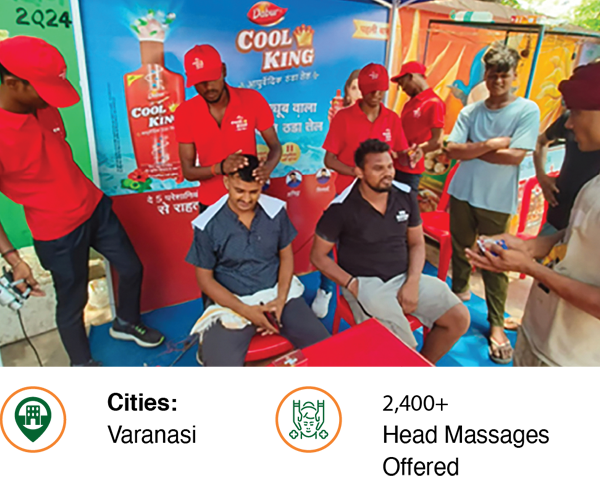
Dabur Oral Care Nauchandi Mela Campaign
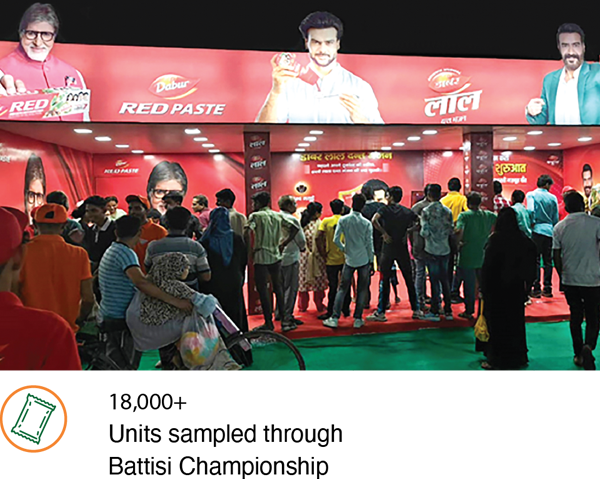
Dabur Glucose Vote with Full Energy Campaign
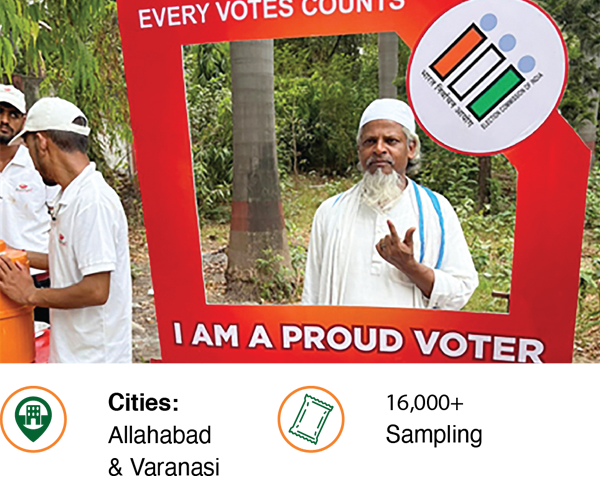
Dabur Cool King Thandak Zone at Nauchandi Mela
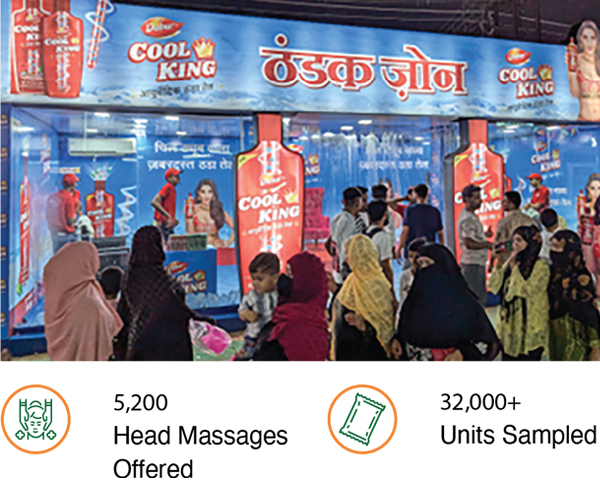
Hajmola Chatkara Championship at Nauchandi Mela
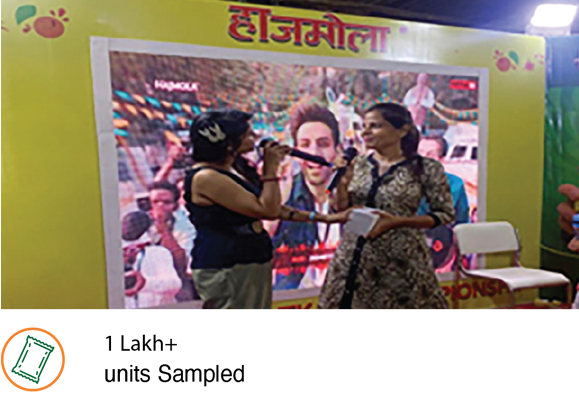
Kanwar Yatra Activation
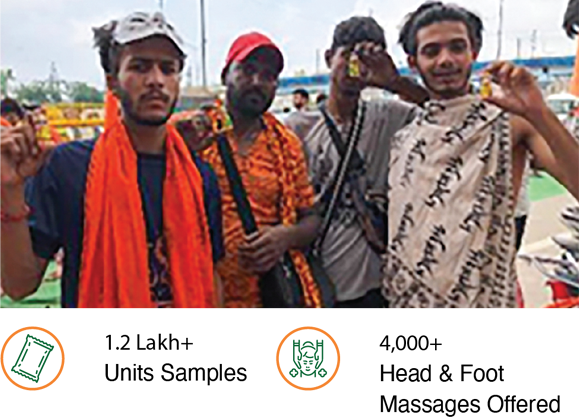
Pudin Hara Fizz Installation at Nauchandi Mela

Dabur Honey Panchamrit activation on Mahashivratri

Dabur Red Balm at Pandharpur Yatra
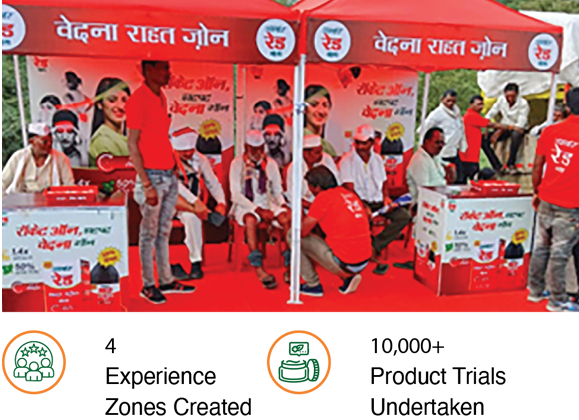
Dabur Cool King Thandak Zone at Puri Rath Yatra

Free Health Counselling & Product Sampling at Bageshwar Dham
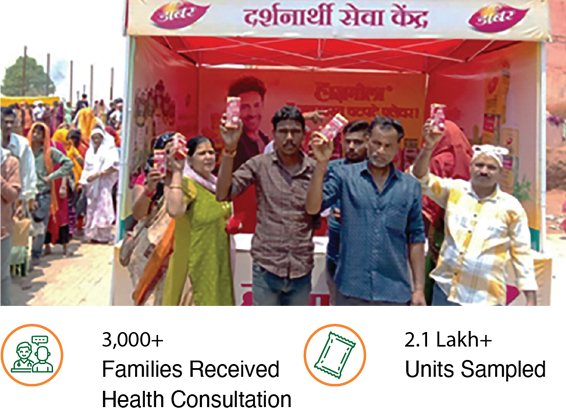
Product Sampling Zone at Maha Kumbh
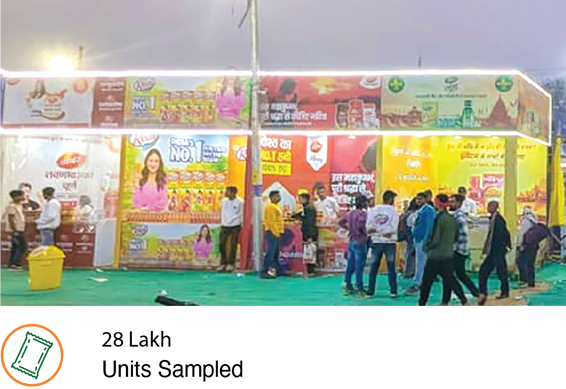
Swasth Naari, Sashakt Naari Health Camps
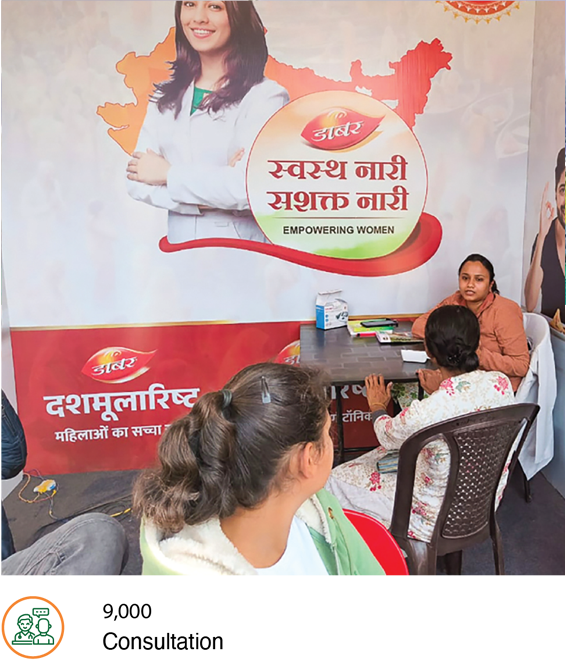
Dabur Red Paste Dant Snan at Maha Kumbh
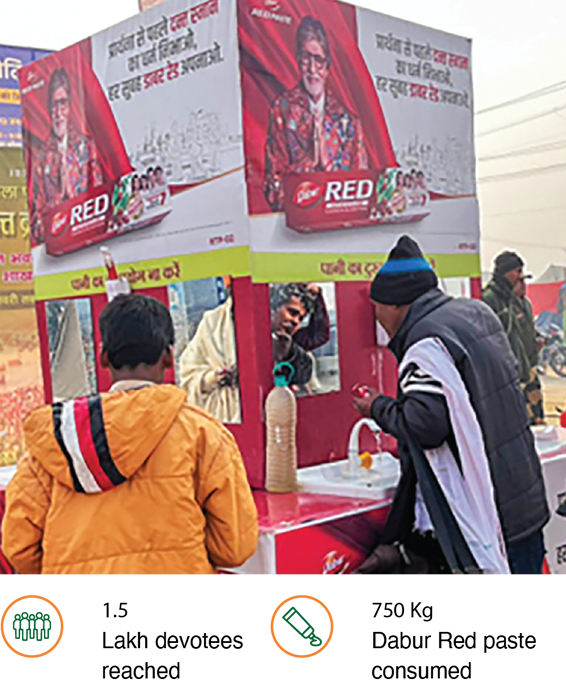
In today's hyper-competitive environment, building strong and long-lasting relationships with each generation of consumers based on their unique attributes is crucial for any brand's success. At Dabur, we have been effectively reaching out to each generation, communicating with them in their preferred language, through the media they consume, and with the content they prefer.
Focusing on millennials and centennials, a significant portion of our specially created content is shared on digital platforms.
₹23.74 CRORE
spent on Digital in FY 2024-25 (Total Digital Spend comprises Digital Media and Influencer Activities)
173
Digital Campaigns
4
Billion + Impressions
835
Million + Views
500+
Creators Engaged
40
Awards Bagged
Following are some of the highly popular digital media campaigns undertaken by our brands over the past year:
Dabur Red Paste World No Tobacco Day Take #TheBatteesiExperiment

Odomos #SurakshaBandhan Campaign on Rakshabandhan
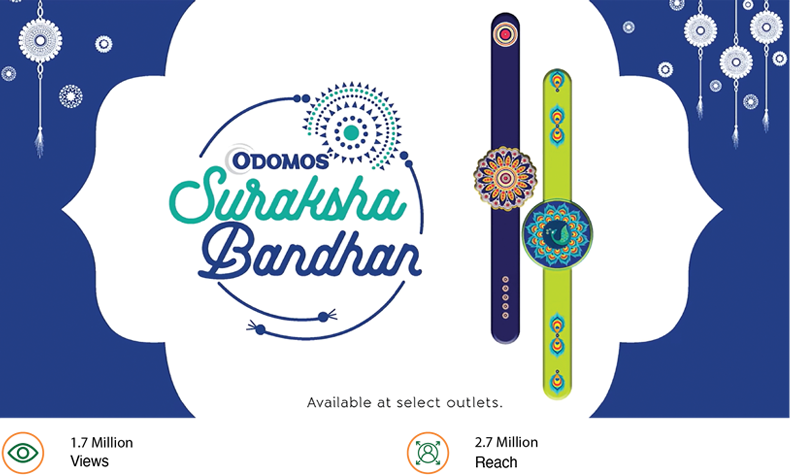
Dabur Honey OTT debut with "Heroes of Honey" on Hotstar
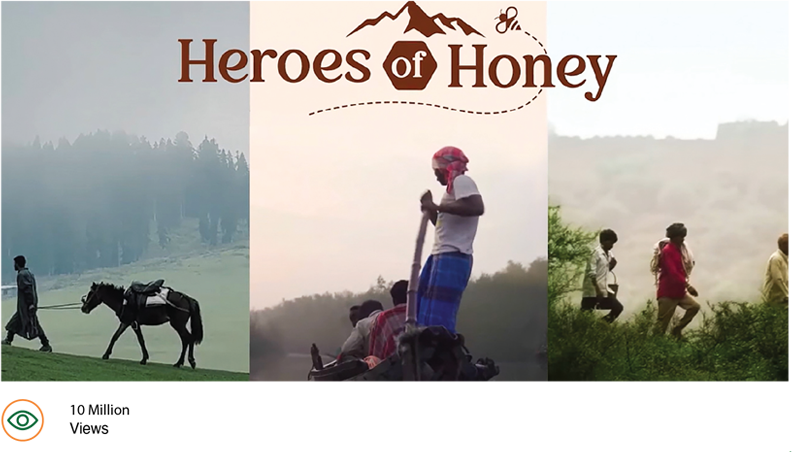
Fem Karwa Chauth Campaign

Dabur Amla I'm Big, I'm Brave, I'm Beautiful Women's Day Campaign

Real Activ Anti-Cola Campaign

Dabur Chyawanprash Regional AI Marketing Campaign with Sourav Ganguly

Dabur Amla Hair Oil Maha Kumbh Triveni Campaign

Dabur Honey Advocacy Campaign to Bust Crystallisation Myths

Dabur Red Paste Dant Snan Digital Activation covering on-ground elements

Dabur Amla Hair Oil Rakshabandhan Campaign

At Dabur, community development and consumer engagement are not peripheral efforts — they are integral to how we define and deliver value. As we step into the next chapter of our journey, our focus is to amplify the positive impact we create in the communities we serve, while forging deeper, more meaningful connections with our consumers.
We remain committed to building a more equitable and inclusive society through high-impact social interventions. Moving forward, our community development agenda will be guided by three key priorities:
- Expanding Reach: We will scale up initiatives in education, healthcare, and livelihood enhancement, particularly in underserved rural and peri-urban areas.
- Driving Sustainability: Our programmes will be increasingly aligned with environmental goals — such as water conservation, afforestation, and sustainable agriculture — ensuring that economic development goes hand in hand with ecological responsibility.
- Fostering Partnerships: We will collaborate more closely with local governments, NGOs, academic institutions, and community leaders to co-create long-term solutions that are context-specific and community-owned.
While engaging with our ever-evolving consumers, we will work towards building on Dabur’s heritage of trust by creating authentic, two-way engagement platforms that go beyond transactions. Key elements of our consumer connect strategy include:
- Listening Actively: Leveraging digital platforms, social media, and community outreach to gain real-time insights into consumer needs, expectations, and feedback.
- Building with Purpose: Infusing our brand communication with purpose-led storytelling that highlights our Ayurvedic roots, sustainability efforts, and community impact.
- Co-Creation and Customisation: Involving consumers in product ideation and innovation processes, especially in new-age categories like health supplements, personal care, and wellness foods.
- Inclusive Reach: Expanding access through language localisation, regional campaigns, and rural outreach programmes, ensuring we remain accessible and relatable to every Indian household.
As we move forward, Dabur remains deeply committed to being a force for good, enriching lives not only through our products but through our presence, our actions, and our purpose. By combining community upliftment with consumer-centric innovation, we aim to create a future where business growth and societal wellbeing move forward hand in hand.

